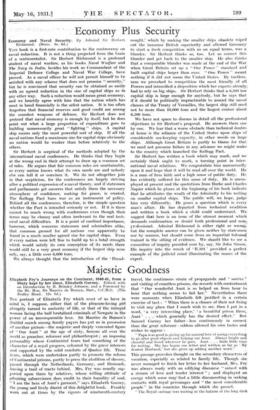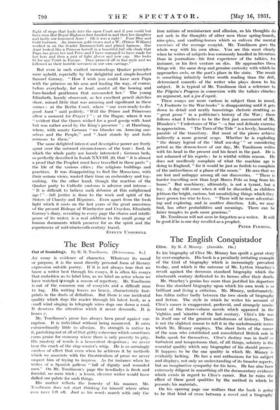Majestic Goodness
Elizabeth Fry's Journeys on the Continent, 184041, from a Diary kept by her niece, Elizabeth Gurney. Edited, with an Introduction by R. Brimley Johnson, and a Foreword by the Rt. Hon. Sir Maurice de Bunsen, Bart., C.C.M.G. (The Godley Head. 12s. 6d.) .Tur.: portrait of Elizabeth Fry which most of us have in -mind is, I suppose, .either that of the pleasure-loving girl Abruptly turned to austerity of life, or that of the intrepid :woman facing the half brutalized2criminals of Newgate in the power of an unconquerable love. Sir Maurice de Bunsen's ;fruitful search among family papers has put us in possession of another pioture—the majestic and deeply venerated figure pf Our Aunt " at the age of sixty, famous all over the :world as preacher, reformer and philanthropist ; an imposing ;personality whose Continental tours had something of the
,character of a royal, progress, coloured by the grave interests and supported by the solid comforts of Quaker life. These ,tours, which were undertaken partly to promote the reform of Continental prisons, partly to press the abolition of slavery, passed through the Netherlands, Germany, and Denmark, :leaving a trail of- tracts behind. Mrs. Fry was usually sup- ported upon them by relatives; whose willing attitude of .admiring subservience does. credit Jo_ their humility of soul.
" I am the hem of Aunt's garment," says Elizabeth Gurney, the young and lively diarist of this delightful book. Frankly worn out at times by the rigours of nineteenth-century
travel; the continuous strain of propaganda and " soirees 7 and visiting of countless prisons, she records with contentment that " Our wonderful Aunt is so helped on from hour to
hour that nothing seems to fail her." Nevertheless there were moments when Elizabeth felt. justified in a certain exercise of tact : " When there is a chance of their not fixing to visit any place that I much wish to see, then I put in a word, ' a very interesting place,' a beautiful prison there,
Aunt ' - which generally has the desired effect." But Samuel Gurney her father—less continuously in earnest than the greet reformer—seldom allowed his own tastes and
wishes to appear : " Papa is so good in giving up his natural love of seeing everything to go after good objects and helping our Aunt. Always bright and cheerful and loved wherever he goes. Aunt . . . finds little time for writing. She has begun one letter and written as far as ' My dearest Husband,' but she gives up adding another word."
This passage provokes thought on the secondary characters of vocation, especially as related to family life. Though she never managed to finish her letter to her husband, Mrs. Fry was always ready with an edifying discourse " mixed with a stream of love and tender interest " ; and displayed an energy which some marfind a little disconcerting in seeking contacts with royal personages and " the most considerable people " Art the countries through which she passed.
The Royal carriage was waiting at the bottom of the long dark
flight of steps that leads into the open Court and if you could but have seen Her Royal Highness first handed in and then her daughter and lastly our honoured Aunt ! Oh it was a sight ! Four Blue and Cold footmen. An immense gold crown and a W. (Prince William) worked in on the Scarlet Hammercloth and plated harness. Our Aunt looked like a Princess herself in a beautiful/id/ silk cloak that Papa has given her and Price and I have managed to have made for her here and then a pair of light gloves and new cap. She looks fit for any Court in Europe. They pranced off in fine style and we followed as their humble servants in our own carriage:*
But even in such exalted surroundings Quaker principles were upheld, especially by the delightful and simple-hearted Samuel Gurney. " How I wish you could have seen Papa
with the princess on his arm and leading the way, of course; before everybody, hat on head, amidst all the bowing and bare-headed gentlemen that surrounded her." The 'young Elizabeth, keenly observant, as her excellent pencil sketches
show, missed little that was amusing and significant in these scenes : at the Berlin Court, where " our ever-ready-to-do- good Aunt " said politely, "Will the Prince and Princesses allow a moment for Prayer ? " ; at the Hague, where it was " evident that the Queen wished for a good gossip with Aunt but was rather awed by the King's presence " ; at Hamburg, where, with scanty German " we blunder on, Amusing our-
selves and the People," and " Aunt stands by and looks
sermons to them."
The same delighted interest and descriptive power are freely spent over the outward circumstances of the tour : food, in which the whole party are keenly interested ; German beds, so perfectly described in Isaiah XXVIII. 20, that " it is almost a proof that the Prophet must have travelled in these parts " ; the life of the various cities ; the religious buildings and practices. It was disappointing to find the Moravians, with their serious views, wasted their time on embroidery and toy- making. On the other hand, though the reaction of the Quaker party to Catholic customs is adverse and intense-
" It is difficult to believe such delusion at this enlightened age ! "—full justice is done to the work and spirit of the Sisters of Charity and Beguines. Even apart from the fresh
light which it casts on the last years of the great ancestress of the present Bishops of Winchester and Croydon, Elizabeth
Gurney's diary, revealing in every page the charm and intelli- gence of its writer, is a real addition to the small group of human documents which preserve for us the spirit and the experiences of mid-nineteenth-century travel.
EVELYN UNDERHILL



















































 Previous page
Previous page